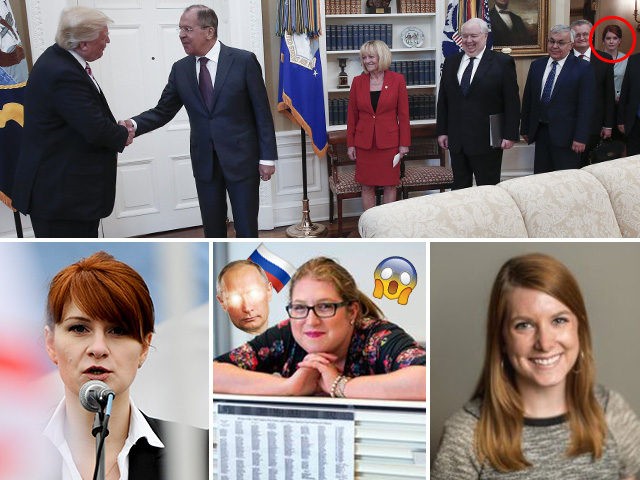Emily Singer, a senior political reporter for Mic.com, set off a mini Red Scare Tuesday morning by suggesting a White House staffer pictured in the Oval Office was actually an alleged Russian spy — then scrubbed the quickly debunked claim from her verified Twitter account.
Singer shared a photo of President Donald Trump hosting a group of top Russia officials at the White House on May 10, 2017, including then-Ambassador to the U.S. Sergey Kislyak and Foreign Minister Sergey Lavrov — seen in a New York Times story covering that meeting — and zeroed in on a red-headed woman in the door of the Oval Office.
Singer soon after expressed doubt over whether she correctly identified Butina in the photo, conceding that it “may be Cari Lutkins,” a member of the White House National Security Council. “I may delete this tweet,” Singer told her 20,000 Twitter followers.
Lachlan Markay of the far-left Daily Beast said that a former White House staffer also suggested the picture showed Lutkins, saying that her role includes “logistics” for events like Lavrov’s visit.
A few minutes after expressing doubts about her original conclusion, Singer deleted her erroneous tweet.
Numerous left-wing news outlets, politicians, celebrities, writers, and pundits ran with Singer’s fake news blunder, then had to update and correct their stories.
https://twitter.com/StefSimanowitz/status/1019202062473728000
https://twitter.com/Ken_Daley/status/1019199203355054080
https://twitter.com/tammylively/status/1019190042550505474
Singer’s misfortune continued as conservatives began spoofing her tweet with photos of various red-headed women.
Federal prosecutors in Washington revealed Monday that they arrested the 29-year-old Maria Butina and accused her of working as a covert Russian agent, gathering intelligence on American officials and political organizations through her gun-rights contacts.
The announcement of the arrest of Butina came just hours after President Trump met with Russian President Vladimir Putin and just days after special counsel Robert Mueller charged 12 Russian intelligence officials with directing a sprawling hacking effort aimed at swaying the 2016 election.
Mueller did not file the charge against Butina, but court papers show that her activities revolved around American politics during the 2016 campaign and included efforts to use contacts with the National Rifle Association and American politicians to gather intelligence for Russia.
Court papers also reveal that an unnamed American who worked with Butina claimed to have been involved in setting up a “private line of communication” ahead of the 2016 election between the Kremlin and “key” officials in an American political party through the NRA. The court papers do not name the political party mentioned in the October 2016 message, but they contain details that appear to refer to the Republican Party.
Butina, a Russian national who has been living the U.S., was charged with conspiracy to act as an unregistered agent of the Russian government. A federal judge in Washington ordered her detained until a hearing set for Wednesday, according to a statement from the Justice Department and Jessie Liu, the U.S. Attorney for the District of Columbia.
In a statement, Butina’s attorney, Robert Driscoll, called the allegations “overblown” and said prosecutors had criminalized mundane networking opportunities. Driscoll said Butina was not an agent of the Russian Federation but was instead in the U.S. on a student visa, graduating from American University with a master’s degree in international relations.
“There is simply no indication of Ms. Butina seeking to influence or undermine any specific policy or law or the United States — only at most to promote a better relationship between the two nations,” Driscoll said in a statement. “The complaint is simply a misuse of the Foreign Agent statute, which is designed to punish covert propaganda, not open and public networking by foreign students.”
The Associated Press contributed to his report.

COMMENTS
Please let us know if you're having issues with commenting.